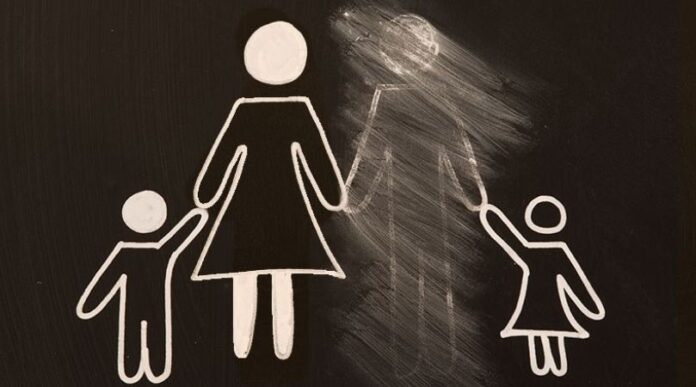You are not signed in as a Premium user; we rely on Premium users to support our news reporting.
Sign in or Sign up today!
In 1960, there were just under 6 million American minors living with only one parent —a number which, at the time, represented not even 10% of the nation’s child population. Fast forward 60 years to 2020, and that number has more than tripled to over 18.5 million minors living with one parent — a haunting 25% of the current child population.
And in most cases, it’s the father that’s out of the picture. As a matter of fact, in 2020, of the over 18.5 million children living with only one parent, well over 80% of these cases consisted of the child living without his father.
Looking at the data reflecting the number of kids growing up with only their mother, it’s apparent that, with regard to the marital status of these mothers, the “never married” group has increased meteorically since the 1960s.
In another census graph, the same trend is shown: The percent of children born out of wedlock is shown to go from around 7% in 1964 to beyond 40% in the course of 50 years.

The decrease in marriage and increase of father absence has two main causes: (1) the contraceptive culture and (2) the welfare state.
1965 will go down in infamy for giving America Griswold vs. Connecticut, a 7–2 U.S. Supreme Court ruling that allowed married couples to buy and use contraceptives without government restriction.
Before 1965, Griswold was a seemingly inevitable reality, as over the previous 35 years, every non-Catholic Christian denomination accepted contraception in one way or another. It started with the Anglicans, as they became the first Christian denomination to accept contraception at their 1930 Lambeth Conference.
Griswold is the 7–2 U.S. Supreme Court ruling that allowed married couples to buy and use contraceptives without government restriction.
While all Protestant denominations eventually compromised with this moral evil, the Catholic Church remained steadfast.
In 1968, Pope Paul VI declared, in his encyclical Humanae Vitae, what the Church has always taught: “It is a serious error to think that a whole married life of otherwise normal relations can justify sexual intercourse which is deliberately contraceptive and so intrinsically wrong.”
Today, 92% of Americans believe birth control is morally acceptable, while 71% believe fornication is morally acceptable.
The United States chose to surrender to the times, and, as a result, today, one in four children (25%) live without a biological, step or adoptive father in the home.
There are many things that lead to a quarter of children growing up without a father in America, but one of the biggest factors is the welfare state. In 1964, Lyndon B. Johnson declared his “War on Poverty” in America.

According to the U.S. Census Bureau, since shortly after the so-called War on Poverty began, the poverty rate has remained flat, reflecting no significant change.
This is because, although the government started spending many more federal tax dollars on people and families in poverty, time has proven that it does not raise their income, nor does it lift them out of poverty.
In fact, in many ways, it traps them in poverty.
The official poverty definition, according to the U.S. Census Bureau, looks at income before taxes, and this does not include non-cash benefits like public housing, Medicaid and food stamps — all provided by the government through the welfare system.
Over time, as more free benefits (like housing, Medicaid and food) are dished out to low-income Americans, the income of the benefit recipients remains the same. This is why the poverty rate in America hasn’t budged in 50 years.
And, while this happens, more and more people become dependent on the government.
According to U.S. Census figures, welfare spending was at roughly $400 billion in 1991. But although a mint was being spent to get more people out of poverty, poverty was rising sharply in the United States — while Americans’ incomes were declining.
1991 was the same year Pope John Paul II wrote his encyclical Centesimus Annus on the 100th anniversary of Pope Leo XIII’s monumental work on the Church’s social teaching, Rerum Novarum.
Pope John Paul knew about this new type of regime, referred to as the “welfare state” or the “social assistance state.”
He responded to this problem by emphasizing the principle of subsidiarity — the principle that says problems are best handled and solved at the lowest level of efficacious government intervention.
He noted:
By intervening directly and depriving society of its responsibility, the social assistance state leads to a loss of human energies and an inordinate increase of public agencies, which are dominated more by bureaucratic ways of thinking than by concern for serving their clients and which are accompanied by an enormous increase in spending.
So in the wake of the contraceptive mindset spreading throughout the country, the U.S. government took to incentivizing father absence through the child-support branch of the welfare system.
In 1960, there were just under 2 million black children living with one parent.
The amount of money one receives from child support is dependent on how much time the “custodial parent” has with the child, and the “custodial parent” is the mother in well over 80% of cases.
In 1960, there were just under 2 million black children living with one parent; this translated to just over 20% of American black children living with one parent. Jumping ahead 60 years to 2020, that number has nearly tripled to 5.5 million black children living with one parent. This devastating statistic suggests that over 50% of American black children live with only one parent.
And the trend of father absence follows. In 2020, of the over 5.5 million black children living with one parent, well over 90% of these cases involved the child living without the father.
In this week’s Mic’d Up, Michael Voris interviews Fr. Donald Calloway about his book, Consecration to St. Joseph: The Wonders of Our Spiritual Father.
— Campaign 31877 —
Have a news tip? Submit news to our tip line.

We rely on you to support our news reporting. Please donate today.


























